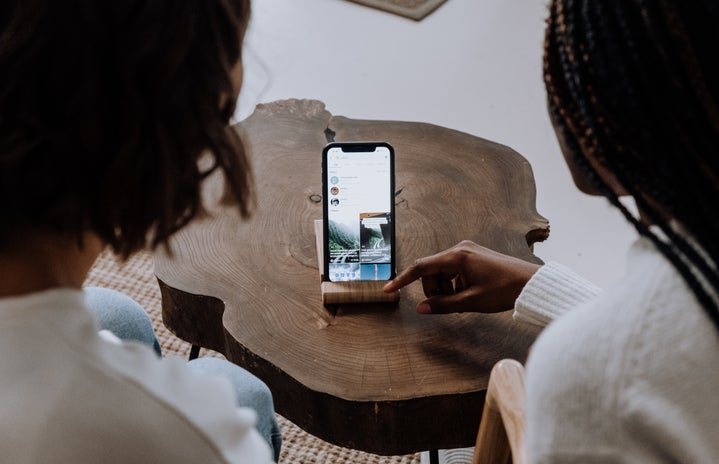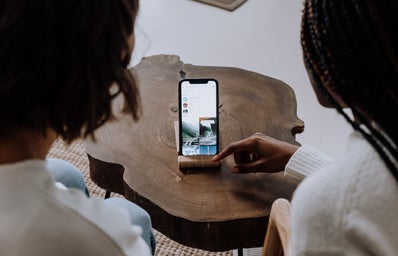I am a deeply unserious person. I tend to make light in the darkest times and use dark humor to my advantage when I need it most and there’s nothing truly wrong with that, at least in moderation. Irony and humor are practically pillars of Gen Z culture, but it’s slowly getting to the point where those qualities leave us desensitized to the world around us, unable to put on a more serious lens at horrors around us or even take a serious look at the media we consume. Although we dismiss these things with an air of irony and brush them off in a tweet or two, the problems are still there. We can hide with a smile or a giggle, but it’s still there nonetheless.
A couple of weeks ago, singer Ethel Cain took to her Tumblr to proclaim that we were in an “irony epidemic” in relation to our culture as a whole, but in regards her own relationship with listeners’ interpretations of her work.
“Nobody takes anything f*cking seriously anymore. It makes me feel so crazy and annoyed because I am constantly bombarded by jokes constantly,” wrote Cain.
She elaborated on this by saying “I LOVE to laugh and i love funny sh*t but like, we are in an irony epidemic. There is such a loss of sincerity and everything has to be a joke at all times.” Although she’s quite blunt and colorful in her language, in true Ethel Cain fashion, she’s not wrong at all.
Meme culture has become one of the most prevalent vessels of communication when it comes to having conversations about pretty much everything. I recently downloaded X (although I will forever call it Twitter)and it’s been a pretty bittersweet experience so far. I do enjoy feeling plugged into whatever it’s in the cultural conversation that day, whether it be discourse on new music releases or exploring new perspectives on world issues or random things like the “Timothee Chalamet Look-Alike Contest” in New York City. The app’s timeline is like a randomized grab-bag of topics, but it’s also kind of exhausting.
It’s even worse on TikTok, although I love it. It’s been weird to see so many people on my For You page who have been dressing as true crime figures for Halloween and treating cases that caused real harm as nothing more than costumes. It comes across as a bit tone deaf to me, though many people probably thought it was a funny subversion of the serious nature of these cases.
I notice this idea of finding the humor and irony most prevalently in regards to different pieces of media, especially ones that deal with serious subject matter. Now I know most media is for entertainment purposes, even ones with important messages behind this, but it gets to a point where some stuff just isn’t worth joking about. I know it’s been the year of “brat” and the idea of irony and “camp” in music has been the most popular one, but that idea just doesn’t really work in every single context.
I think if it was the creator’s intention that’s one thing, a la “Brat” but that’s not necessarily always the case with most things and I think a lot of people tend to forget that. When FKA Twigs’ song “cellophane” began making the rounds on TikTok, many people turned her gut wrenching ballad that is based on the racist vitriol she received during her relationship into this cartoonish parody of itself with many people using the song for videos of their dogs and creating covers of it by Miss Piggy from The Muppets. While many people saw it as a funny way to make light of a sad song, it basically just erased the meaning of it, whether intentionally or not. I think this kind of thinking encapsulates where Gen Z is at when it comes to having serious discourse and the idea of irony. Although it’s harmless most of the time, it’s a slippery slope into a much larger problem.
It becomes a much larger problem when this “ironic” mindset gets taken into politics and conversations of larger social issues, because personally I just don’t think there is much to really laugh about. I will never forget back in 2020 when the whole “Hello Kitty says ACAB” meme was trending on TikTok and when people created songs and glittery instagram story infographics to bring attention to the murders of Breonna Taylor and George Floyd. It felt tacky and in hindsight it probably did less to help “Black Lives Matter” than many people who reposted it though they were doing. It trivialized the subject matter and almost made a mockery of the movement when thinking about the pain felt in that moment. I think many people tried to make light out of such a dark time especially considering the backdrop of the pandemic, but it came off more of an observation of just how weird of a place we are in as a generation. We tried to make light out of the darkness, but at what cost?
Now, we are at peak election season and with so much turmoil in our culture right now, it seems like this cultural irony has reached the worst place it could be. Much of the election discourse online has taken a turn for the humorous and ironic, but it gets to the point where there isn’t much to laugh about anymore. So much is on the line and I’m not really sure that there is much humor left to find in it. There is so much on the line politically and our world can be so incredibly dark sometimes, but I think it’s starting to reach a place where this idea is reaching the mainstream and many people think that all Gen Z is able to understand is irony and humor, which is both a blessing and curse.
I think it’s time for us to take a look at how we truly process serious topics and start to use our irony and dark humor in moderation. If it gets to a point where certain topics become internet meme fodder, then we’ve truly lost whatever of the plot we have left. Yes, we are in an “irony epidemic” and it is time for us to get a bit serious for a second.


